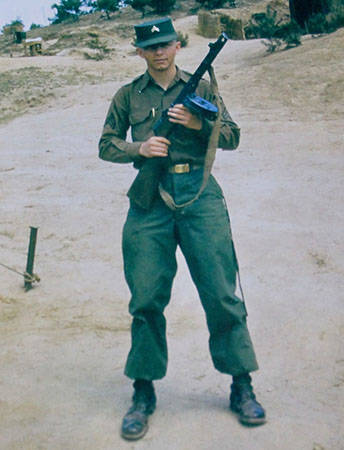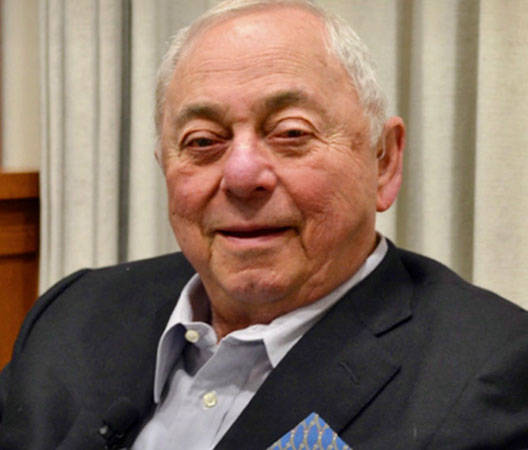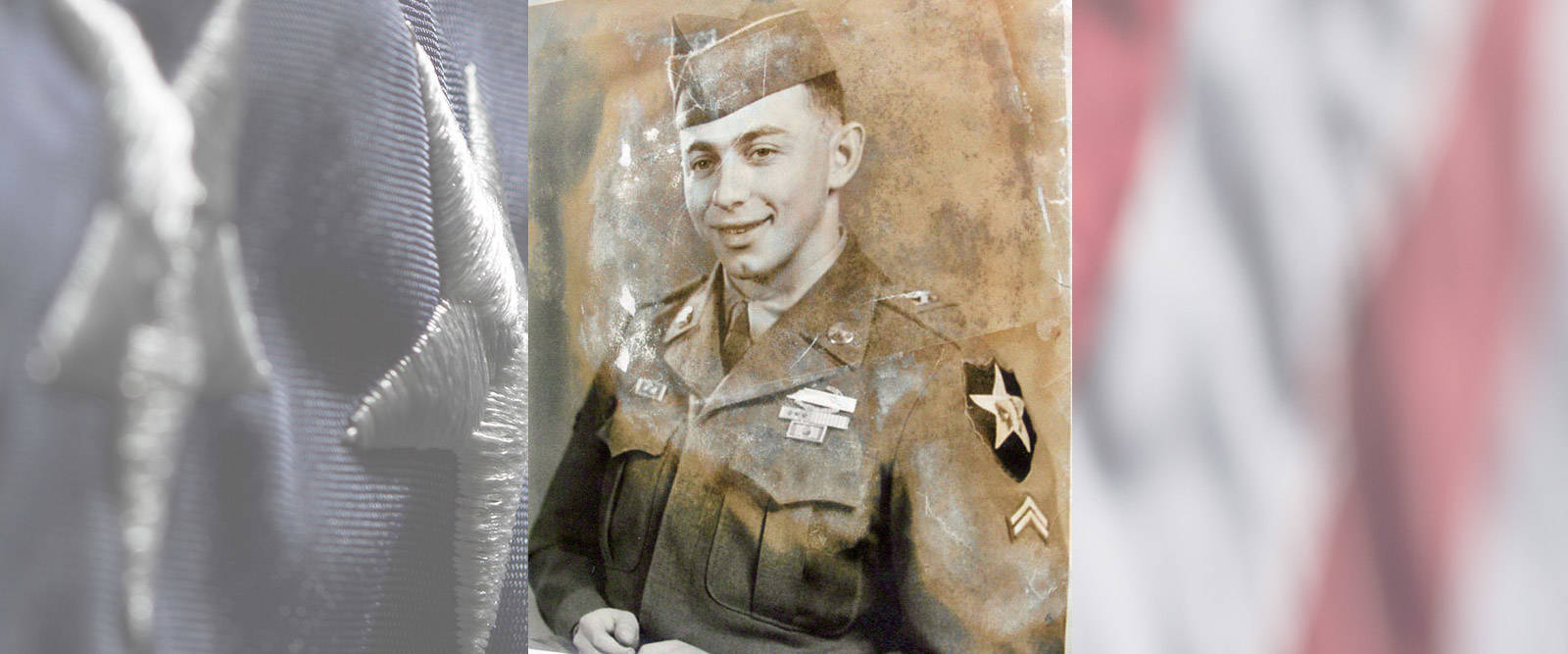U.S. Army Korean War Highland Park, IL Flight date: 04/11/18
By David Adams, Honor Flight Chicago Veteran Interview Volunteer
Jerome “Jerry” Adler grew up in Jersey City, New Jersey during the midst of the Depression in a family of three boys. As he remembers, “My family hardly had two nickels to rub together.” By age 9, just after the world reverted to war again in 1939, Jerry took a job as a newspaper delivery boy to relieve his dad from giving him a weekly allowance. During secondary school, he worked as a layer cake decorator and a packer for various bakeries in his hometown. After high school, Jerry enrolled in Rutgers University, a 90-minute train ride from his home. He admits struggling in college and at the end of his sophomore year, enlisted in the Army, much to the chagrin of his parents. Jerry remarked that his enlistment was motivated in part by the battlefield death of a childhood friend in Korea during the first year of that war.
Jerry began his three-year enlistment on July 24, 1951. What followed was Basic Training at Ft.Dix, New Jersey including 16-week infantry basic, 8-week advanced basic, and 8-week leadership training. Finally, 6-8 weeks of artillery school at Ft. Sill, Oklahoma. He considered himself a fully trained infantryman. After a welcomed 30-day home leave, Jerry reported to Ft. Lawton in Seattle for embarkation to Korea in July 1952. He vividly remembers the 17-day voyage to Japan during which there was nothing to do. A brief stop in Yokohama was followed by a final 3-day voyage to Incheon, Korea.
Jerry reported to the 2nd Infantry Division Replacement Center which sorted out incoming soldiers for assignment to needed slots within the Division units. He was assigned to the 2nd Infantry Division, 38th Infantry Regiment, 3rd Battalion, which was awaiting orders to move up to the line. Jerry “tried out” for the Browning Automatic Rifle (BAR) squad, but gratefully failed to qualify. He knew from frontline soldiers that the enemy especially targeted the BAR two-man teams. As events unfolded, Jerry’s ultimate assignment exposed him to great risk.The battalion intelligence officer needed Jerry as a “volunteer” in his Intelligence and Reconnaissance (I&R) team. He learned that the 2nd Division, nicknamed the “Indianhead” Division, had been in Korea from the outbreak of the war.
He remembers that the I&R team had two primary duties. First it functioned as “the advance team,” becoming familiar with the new territory, enemy positions and enemy inclinations. The second duty was to plan and execute patrols across the line into enemy or disputed ground. Jerry vividly recalls his patrols, all conducted at night, slipping through the line a considerable distance and setting up a listening post (LP). An I&R patrol would stay at the LP for hours, listening for enemy movement, and then returning to the line before dawn. “The Chinese knew we were there, I am certain of it,” he says. “I recall one night it had snowed, and as we headed back, you could see footsteps in the snow nearby. A firefight would erupt while we were on patrol, and each time the Chinese started it.” Jerry became adept at reading maps and interpreting aerial photos. More than once Jerry flew in a light plane which conducted low-level reconnaissance over Chinese-held territory to identify patrol and vehicle paths. “Each time I was told that the Chinese never shot at small planes so as not to reveal their position. It must be true — we were never shot at,” he remembers.

On the line, he states that “I was in a perpetual state of being semi-scared and awake. I slept in a sleeping bag, with my M1 rifle inside the bag and next to me.” Winter was so cold he didn’t think he would ever warm up. Then in summer, it was very hot and the monsoon season turned ordinary paths into rivers. Jerry chuckles at the random visits from “Bedcheck Charlie,” an enemy low-flying small plane intent on disrupting the troops with small bombs but mostly noise.
Jerry recalls that there was seemingly no level ground in Korea. The sector assigned to the 2nd, the Jamestown Line situated on the western end of the Main Line of Resistance (MLR), encompassed many hills. “In my sector they were Pork Chop Hill, Three Sisters, Wishbone, Heartbreak Ridge, and Old Baldy,” he remembers. His most vivid and dramatic combat encounter involving his unit related to “Old Baldy.” It was one of the most prominent hills which earned its nickname after artillery and mortar fire destroyed the trees on its crest. But as the highest point on a prominent east-west ridge, Old Baldy held strategic importance because it dominated terrain in three directions. Division records reveal that Old Baldy was held by the enemy at the beginning of the war and at the end—no change. Nevertheless, “On September 18, 1952, we fought to recapture our hill, ‘Old Baldy’ in the Battle of Old Baldy.” The Chinese took the hill and in the space of the next few days, Jerry’s unit retook the hill suffering significant losses. This battle was emblematic of what Jerry remembers as a “deadly stalemate.”
The food on the line in Korea was better than that supplied in World War II. To this day, among the C-rations he ate, “I liked the stews and spaghetti, but not so much the corned beef hash.” As with all soldiers in combat, Jerry devoured the food packages sent from home. His mother sent chocolate chip cookies and brownies and his father sent salamis from the famous New York City Katz’s Deli.
Toward the end of his tour, his commander remarked in Jerry’s formal evaluation that “By keeping the Battalion Commander and staff completely briefed as the enemy’s situation and potentialities, the Third Battalion was placed in an ideal position to observe any move the enemy might make regardless of what the position the Battalion was occupying.” He remembers having been recommended by his Battalion Commander for a direct commission while he was still in Korea. He was unaware of this fact until the recommendation surfaced after he returned to the States. He rotated back to the States in the summer of 1953 about the time of the Armistice. Jerry spent his last year of duty assigned to 1st Army, Headquarters Company, at Ft. Jay on Governors Island, New York Harbor, where he was involved with battle plans.

During this last year of his three-year enlistment he was selected as First Army Soldier of the Year. Instead of remaining in the Army and taking advantage of his combat/war plan experiences and close working relationships with senior officers, he chose to be honorably discharged on June 21, 1954. For his service he received the Combat Infantry Badge of which he is most proud. In addition he received the Army Commendation Medal, Combat Ribbon with Metal Pendant, Korean Service Medal with two Bronze Service Stars, United Nations Service Medal with an Overseas Service Bar and National Defense Service Medal.
With the aid of the G.I. Bill, a scholarship, and a job covering Rutgers sports for the Newark Star Ledger and the Associated Press, Jerry was able to re-enter Rutgers. In a story familiar to those that have served, aspects of college which were previously too difficult before the Army were now easy. According to Jerry, “The Army taught me how to be confident in myself.” At Rutgers he excelled in his studies, graduating in 1956. Not only did he garner a B.A. from Rutgers, he also met his future wife Elaine who graduated the same day as Jerry with her M.A. They married a year and half later.
With a college degree, he pursued a career as a writer first in Macy’s advertising department then with the McCann Erickson Advertising Agency. Later an executive recruiter placed him into the wine and spirits industry. He held executive positions with Mogen David Wine Corporation, the wine division of Coca Cola, and Heublein. Starting his own business, he co-founded Takeout Taxi, a corporate catering company, and D.J. Dotson, a beverage specialty company.
During the past few years, Mr. Adler has become active with the American Legion and the Combat Infantryman’s Association. Jerry and Elaine will celebrate 60 years of marriage this coming August. They have a son, a daughter and one granddaughter.
Jerry, thank you for your faithful service to our nation and sacrifice during the “Forgotten War.” Enjoy your well-earned trip to Washington, D.C.



